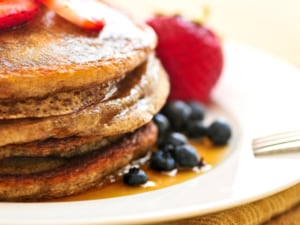Easiest Healthy Pancake Recipe
Whole wheat flour pancakes are difficult to master because they should be light, delicate, and fluffy. These healthy pancakes are made of whole wheat flour and are light and fluffy and satisfy you for hours.

Note: Dr. Meri's recipe posts include scientific and technical information. Reading them will teach you how to plan healthier meals. If you're in a hurry, skip ahead to the recipe!
Healthy pancake ingredients
These pancakes are very easy to make. Nothing strange that you've never heard of is in there. Simple, daily basics like milk, eggs, and whole wheat flour. They don't contain butter. instead of whole milk, I used non-fat milk. So you may enjoy them without guilt!

Milk
Low-fat or non-fat milk is often the ideal milk for losing weight since it has fewer calories and fat than full milk. They provide high-quality protein and calcium, which can help you feel full and help you lose weight.
Eggs
Egg protein has been demonstrated to help with weight reduction by decreasing malnutrition, improving muscle health, and increasing satiety. Other advantages include infection prevention, blood pressure reduction, and anti-cancer activity.
Whole wheat flour
Whole grains provide fiber as well as B vitamins, iron, copper, zinc, magnesium, antioxidants, and phytochemicals. Whole-grain foods aid in the management of cholesterol, weight, and blood pressure. These foods can also help reduce the risk of diabetes, heart disease, and other diseases.
Maple syrup
Many antioxidants included in maple syrup limit the harm that molecules known as free radicals may cause. Free radicals may damage cells when they accumulate to dangerous levels. Diabetes, heart disease, and cancer are among the medical conditions that may result from this.
Together with potassium and calcium, maple syrup also has rather significant concentrations of manganese and zinc. Zinc supports wound healing, strengthens the immune system, and protects against and expedites the healing of respiratory viral infections.
Although you may use any other natural liquid sweetener—artificial sweeteners are not good for you and won't work in this recipe—maple syrup is my personal preference due to its flavor.

Tips
- To have fluffy pancakes, make sure not to over-mix your pancake batter. It's completely OK if there are a few lumps.
- Adding salt doesn’t add any salty flavor to your pancakes. If you’re wondering why salt is used in baking, it is supposed to help bring out all of the flavors of the ingredients in your batter.
- A pinch of salt should be OK. However, you should limit your daily salt consumption because most people consume more sodium than they need.
What kind of salt should I use?
Sea salt is commonly promoted as being healthier than table salt. However, the nutritional composition of sea salt and table salt is the same. Sea salt and table salt have comparable sodium contents. Use a small amount of whichever salt you want.
PRECAUTION: Your Teflon pots and pans may contain dangerous PFOAs depending on their age. After five years, you should replace nonstick pans. Beware of nonstick cookware manufactured before 2015 since it may contain PFOA.
Healthy alternatives for Teflon cookware
- Cast iron cookware acquires a natural nonstick coating over time, especially if properly seasoned and cared for.
- Carbon steel cookware performs similarly to cast-iron cookware, however, it is less heavy, somewhat more prone to corrosion, and often more costly.
- Ceramic cookware is safe and non-toxic (as long as the coating is not damaged). But ceramic coating is less durable since it cracks, chips, and wears away over time. The cookware is more costly than comparable nonstick utensils.
IMPORTANT NOTE: If your pan sticks or you don't trust it, add a teaspoon of oil to it, wipe it down with a paper towel, and then wipe the pan down between pancakes.

Check out the Easiest Healthy Chocolate Sauce Recipe (3 ingredients).
Other healthy pancake recipes:

These whole wheat pancakes are light, fluffy, and guilt-free. They are naturally sweetened with maple syrup for extra taste and texture. They'll keep you satisfied for hours without any fillers.
- 1 cup (130 gr) whole-wheat flour
- 1 cup (240 ml) nonfat milk
- 1 egg (or 2 egg whites)
- 1 teaspoon baking powder
- 2 teaspoons maple syrup
- 1/4 teaspoon salt
In a large mixing bowl, combine the flour, maple syrup, and baking powder. Then, without overmixing, add the milk, maple syrup, and egg and mix until blended. You can use a mixer in this step.
You may use a manual handheld batter mixer to mix and dispense your batter neatly. If you have a blender, combine all ingredients and blend until smooth and well combined.
Preheat a nonstick pan or a griddle to prevent sticking and guarantee even cooking. Scoop 1/4 cup batter. Alternatively, use a batter dispenser if you have one.
You can make mini pancakes using a mini pancake pan.
Cook your pancakes over medium heat. Although your pan should be hot, you should not use excessive heat. This can lead to inconsistent cooking, with a crisp outside and mushy inside.
Flip your pancakes once. Wait until there are multiple bubbles and your pancake has cooked for at least 2-3 minutes before flipping. Too much flipping might lead them to deflate and lose their delightful fluffiness.
Serving Size 57 g (2 oz)
Servings 8
- Amount Per Serving
- Calories 83kcal
- Calories from Fat 15kcal
- % Daily Value *
- Total Fat 1.7g3%
- Saturated Fat 0.4g2%
- Cholesterol 78mg26%
- Sodium 103mg5%
- Total Carbohydrate 14g5%
- Dietary Fiber 2g8%
- Sugars 3g
- Protein 4g8%
- Vitamin A 150 IU
- Vitamin C 0.6 mg
- Calcium 80 mg
- Iron 0.9 mg
* Percent Daily Values are based on a 2,000 calorie diet. Your daily value may be higher or lower depending on your calorie needs.
- Top with fresh strawberries, bananas, or any of your favorite fruit.
- Drizzle pure maple syrup, honey, or homemade chocolate syrup or sauce.
- Avoid store-bought chocolate syrup and sauces since they are harmful and defeat the purpose of healthy pancakes.



